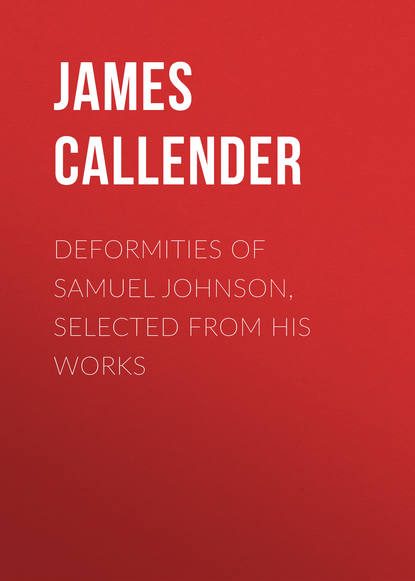По всем вопросам обращайтесь на: info@litportal.ru
(©) 2003-2024.
✖
Deformities of Samuel Johnson, Selected from His Works
Настройки чтения
Размер шрифта
Высота строк
Поля
26
Preface to Shakespeare.
27
Life of Pope.
28
The following extracts from the Doctor's Dictionary are a key to his political tenets: Excise, a hateful tax levied upon commodities, and adjudged, not by the common judges of property, but wretches hired by those to whom excise is paid. Gazetteer, was lately a term of the utmost infamy, being usually applied to wretches that were hired to vindicate the court. Pension, an allowance made to any one without an equivalent. In England it is generally understood to mean pay given to a state hireling for treason to his country. Pensioner, a slave of state, hired by a stipend to obey his master. King, monarch, supreme governour. Monarch, a governour invested with absolute authority, a King. Whig, 1. whey, 2. the name of a faction. Tory, one who adheres to the antient constitution of the state, and the apostolical hierarchy of the church of England, opposed to a whig. Johnson's fol. Dic. The word faction is always used in a bad sense; though, in defining it, the Doctor did not, and, after what he had said of a whig, perhaps durst not say, that a faction is always a term for the supposed disturbers of public peace. 'The most obsequious of the slaves of pride, the most rapturous of the gazers upon wealth, the most officious of the whisperers of greatness, are collected from seminaries appropriated to the study of wisdom and of virtue;' Rambler, No. 180. That is to say, men of learning are a set of the most sneaking, pitiful, time-serving rascals. The reader will make his own applications.
29
See Political tracts by the author of the Rambler. His character of Hambden, the reader will find in the 1st page of Waller's life. Of Milton, he says, that 'his impudence had been at least equal to his other powers. Such was his malignity, that hell grew darker at his frown. He thought women born only for obedience, and men only for rebellion.' There is much more in the same tone; and, with what justice his epithets are applied, let Englishmen judge.
30
Taxation no tyranny.
31
Ibid, No. 89.
32
Idler, No. 85.
33
Tour, p. 59.
34
Tour, p. 84.
35
Idler, No. 82.
36
He should have said causes, for he mentions two. – What is the Doctor's distinction here between habit and custom?
37
Quere, Are we more accustomed to beauty than deformity? or is not the fact otherwise. – Did habit ever make a sick man fond of disease, or a poor man fond of poverty?
38
Vide Preface to folio Dict.
39
Dr Campbell of Aberdeen, on the use of new words, says, 'That nothing can be juster than Johnson's manner of arguing on this subject, in regard to what Swift a little chimerically proposeth, that though new words be introduced, none should be suffered to become obsolete.' This Gentleman ought to have consulted Swift himself. Let him peruse the 'petty treatise,' and then let him blush for having trusted an author void of fidelity.
40
As the venerable and admirable father of the English Dictionary has treated the names of such men as Young and Lyttleton with so little ceremony, the reader will perhaps forgive the insertion of his own character, as drawn by Chesterfield. 'I am almost in a fever, whenever I am in his company. His figure (without being deformed) seems made to disgrace or ridicule the common structure of the human body. His legs and arms are never in the position, which, according to the situation of his body, they ought to be in; but constantly employed in committing acts of hostility upon the graces. He throws any where but down his throat, whatever he means to drink; and only mangles what he means to carve. Inattentive to all the regards of social life, he mistimes, or misplaces every thing. He disputes with heat, and indiscriminately, mindless of the rank, character, and situation, of those with whom he disputes; absolutely ignorant of the several gradations of familiarity or respect, he is exactly the same to his superiors, his equals, and his inferiors; and therefore by a necessary consequence absurd to two of the three. Is it possible to love such a man? No. The utmost I can do for him, is to consider him as a respectable Hottentot.' Churchill's account of our hero comes nearly to the same. And I presume that the inimitable Dr Smollet, has exhibited a third picture of this illustrious original in Humphry Clinker, Vol. 1. – Dr Johnson's letter to the Earl of Chesterfield concludes in these words: 'Whatever be the event of my endeavours, I shall not easily regret an attempt which has procured me the honour of appearing thus publicly, my Lord, your Lordship's most obedient, and most humble servant, Sam. Johnson.' These extracts afford a striking contrast between the severity of the polite peer, and the humble politeness (for once) of the rugged pedant.
41
Lives of English poets, vol. iii. p. 243 and 284. 12mo edit.
42
Vide Life of Dryden.
43
Vid. Dict. article Blood.
44
Excogitation, this combination of letters is to be found in the Doctor's works, though not in his Dictionary.
45
Rasselas, chap. vi.
46
He meant to say there.
47
Tour, p. 16. and 18. &c.
48
Tour, p. 186.
49
Ibid, p. 21.
50
Rambler, No. 79.





